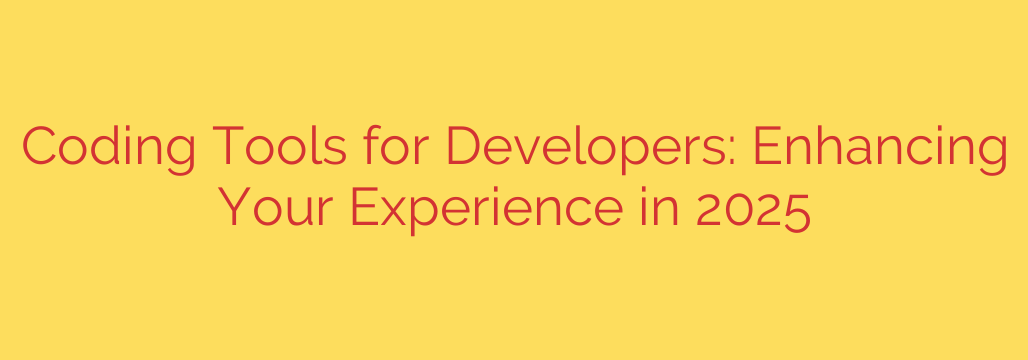
Essential Coding Tools Every Developer Needs in 2025
The world of software development moves at lightning speed. To stay competitive, efficient, and productive, developers need more than just skill—they need a powerful toolkit. The right set of tools can automate tedious tasks, prevent errors, and streamline collaboration, freeing you up to focus on what truly matters: building great software.
As we look ahead, the landscape of developer tools is shifting, with AI assistants becoming indispensable partners and collaboration platforms growing ever more integrated. Whether you’re a seasoned veteran or just starting your coding journey, mastering these essential tools will significantly enhance your workflow and elevate the quality of your work.
The Core of Your Workflow: Integrated Development Environments (IDEs)
Your IDE or code editor is where you spend most of your time, so choosing the right one is critical. It’s your central hub for writing, debugging, and testing code.
Visual Studio Code (VS Code): It’s no surprise that VS Code continues to dominate the development landscape. This free, open-source editor from Microsoft is lightweight yet incredibly powerful. VS Code’s real power lies in its vast marketplace of extensions, which allow you to customize it for virtually any programming language, framework, or workflow. From built-in Git integration to a powerful debugger and an integrated terminal, it has everything you need out of the box.
JetBrains IDEs (IntelliJ IDEA, PyCharm, WebStorm): For developers who need specialized, heavy-duty support, the JetBrains suite is second to none. While VS Code is a versatile jack-of-all-trades, IDEs like IntelliJ IDEA for Java and PyCharm for Python offer deep, language-specific intelligence. Their advanced code completion, robust refactoring tools, and powerful static analysis capabilities can save you countless hours of debugging.
Your New Coding Partner: The Rise of AI Assistants
AI-powered coding assistants are no longer a novelty; they are rapidly becoming a standard part of the modern developer’s toolkit. These tools use machine learning to suggest code, complete functions, and even help you learn new languages.
GitHub Copilot: Developed in collaboration with OpenAI, GitHub Copilot is the clear front-runner in this space. It integrates directly into your editor (including VS Code) and provides intelligent, context-aware code suggestions in real-time. Copilot can generate entire functions, write boilerplate code, and even create unit tests based on simple comments. It acts like an experienced pair programmer, helping you solve problems faster and more efficiently.
Tabnine & Amazon CodeWhisperer: While Copilot leads the pack, strong alternatives like Tabnine and Amazon CodeWhisperer offer competitive features. Tabnine is known for its privacy-focused approach, allowing teams to train the AI model on their own private codebases. CodeWhisperer is a strong offering from AWS, providing excellent support for Amazon Web Services and its associated technologies.
Collaboration and Control: Version Control with Git
In modern software development, working in a team is the norm, and tracking changes is non-negotiable. This is where version control systems (VCS) come in.
Git has become the undisputed standard for version control, and proficiency in it is a required skill for any developer. Paired with platforms like GitHub, GitLab, or Bitbucket, Git allows teams to collaborate seamlessly. It enables you to track every change, revert to previous versions, manage different features in parallel using branches, and merge work without overwriting contributions from others.
Security Tip: Always enable Two-Factor Authentication (2FA) on your GitHub or GitLab account. Since your code is one of your most valuable assets, securing access to your repositories is crucial.
Streamlining Deployment: Docker and Containerization
“But it works on my machine!” is a phrase every developer dreads. Containerization technology, led by Docker, was created to solve this very problem.
Docker allows you to package your application and all its dependencies into a single, isolated “container.” This container can then be run on any machine that has Docker installed, ensuring that the development, testing, and production environments are identical. This consistency eliminates environment-specific bugs and dramatically simplifies the deployment process. Learning to create a Dockerfile for your projects is a high-impact skill that will make your applications more portable and reliable.
Building and Testing APIs with Precision
APIs are the connective tissue of modern applications, and ensuring they are well-designed, documented, and bug-free is essential.
- Postman: This is the go-to tool for the entire API lifecycle. Postman allows you to design, test, and document your APIs in a collaborative environment. You can create complex requests, automate testing suites, and mock servers to simulate endpoints before they are even built. Its user-friendly interface makes it accessible for both frontend and backend developers, facilitating clear communication about how an API should behave.
How to Choose the Right Tools for Your Needs
With so many options available, it’s easy to get overwhelmed. Here’s some actionable advice for building your perfect toolkit:
- Start with the Essentials: Every developer needs a solid code editor, a mastery of Git, and a basic understanding of their command line. Don’t try to learn everything at once.
- Consider Your Tech Stack: The best tools often depend on your primary programming language or framework. A Python developer will benefit greatly from PyCharm, while a C# developer will feel right at home in Visual Studio.
- Embrace AI, But Don’t Rely on It Blindly: Use AI assistants to boost your productivity, but always review and understand the code they generate. Use them as a learning aid, not a crutch.
- Prioritize Collaboration: If you work on a team, choose tools that make teamwork easier. Standardizing on platforms like GitHub, Jira, and Slack ensures everyone is on the same page.
Ultimately, the best developer tools are the ones that make you a more effective and happier programmer. By thoughtfully curating your toolkit, you can spend less time fighting with configurations and more time building the future.
Source: https://collabnix.com/vibe-coding-tools-boost-your-development-experience-in-2025/








